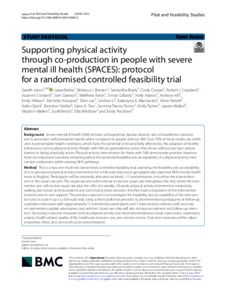JONES, Gareth, BAILEY, Laura, BEEKEN, Rebecca J, BRADY, Samantha, COOPER, Cindy, COPELAND, Robert, CROSLAND, Suzanne, DAWSON, Sam, FAIRES, Matthew, GILBODY, Simon, HAYNES, Holly, HILL, Andrew, HILLISON, Emily, HORSPOOL, Michelle, LEE, Ellen, LI, Jinshuo, MACHACZEK, Katarzyna, PARROTT, Steve, QUIRK, Helen, STUBBS, Brendon, TEW, Garry A, TRAVISS-TURNER, Gemma, TURTON, Emily, WALKER, Lauren, WALTERS, Stephen, WEICH, Scott, WILDBORE, Ellie and PECKHAM, Emily
(2024).
Supporting physical activity through co-production in people with severe mental ill health (SPACES): protocol for a randomised controlled feasibility trial.
Pilot and Feasibility Studies, 10: 32.
[Article]
Documents
33210:637514
![[thumbnail of Jones_et_al-2024-Pilot_and_Feasibility_Studies.pdf]](https://shura.shu.ac.uk/33210/1.hassmallThumbnailVersion/Jones_et_al-2024-Pilot_and_Feasibility_Studies.pdf)

Preview
Abstract
Background
Severe mental ill health (SMI) includes schizophrenia, bipolar disorder and schizoaffective disorder and is associated with premature deaths when compared to people without SMI. Over 70% of those deaths are attributed to preventable health conditions, which have the potential to be positively affected by the adoption of healthy behaviours, such as physical activity. People with SMI are generally less active than those without and face unique barriers to being physically active. Physical activity interventions for those with SMI demonstrate promise, however, there are important questions remaining about the potential feasibility and acceptability of a physical activity intervention embedded within existing NHS pathways.
Method
This is a two-arm multi-site randomised controlled feasibility trial, assessing the feasibility and acceptability of a co-produced physical activity intervention for a full-scale trial across geographically dispersed NHS mental health trusts in England. Participants will be randomly allocated via block, 1:1 randomisation, into either the intervention arm or the usual care arm. The usual care arm will continue to receive usual care throughout the trial, whilst the intervention arm will receive usual care plus the offer of a weekly, 18-week, physical activity intervention comprising walking and indoor activity sessions and community taster sessions. Another main component of the intervention includes one-to-one support. The primary outcome is to investigate the feasibility and acceptability of the intervention and to scale it up to a full-scale trial, using a short proforma provided to all intervention participants at follow-up, qualitative interviews with approximately 15 intervention participants and 5 interventions delivery staff, and data on intervention uptake, attendance, and attrition. Usual care data will also include recruitment and follow-up retention. Secondary outcome measures include physical activity and sedentary behaviours, body mass index, depression, anxiety, health-related quality of life, healthcare resource use, and adverse events. Outcome measures will be taken at baseline, three, and six-months post randomisation.
Discussion
This study will determine if the physical activity intervention is feasible and acceptable to both participants receiving the intervention and NHS staff who deliver it. Results will inform the design of a larger randomised controlled trial assessing the clinical and cost effectiveness of the intervention.
Trial registration
ISRCTN: ISRCTN83877229. Registered on 09.09.2022.
Actions (login required)
 |
View Item |



 Tools
Tools Tools
Tools